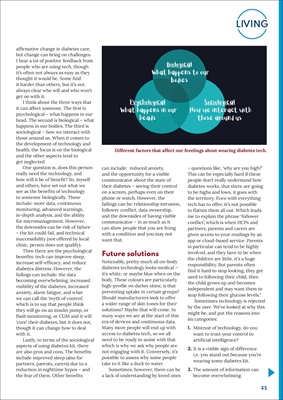
25
LIVING
affirmative change in diabetes care,
but change can bring on challenges.
I hear positive a lot of feedback from
people who are using tech, though
it's often not always as easy as they
thought it would be. Some find
it harder than others, but it's not
always clear who will and who won't
get on with it.
I think about the three ways that
it can affect someone. The first is
psychological - what happens in our
head. The second is biological - what
happens in our bodies. The third is
sociological - how we interact with
those around us. When it comes to
the development of technology and
health, the focus is on the biological
and the other aspects tend to
get neglected
One question is, does this person
really need the technology, and
how will it be of benefit? So, myself
and others, have set out what we
see as the benefits of technology
to someone biologically. These
include: more data, continuous
monitoring, advanced warnings,
in-depth analysis, and the ability
for micromanagement. However,
the downsides can be risk of failure
- the kit could fail, and technical
inaccessibility (not offered by local
clinic, person does not qualify).
Then there are the psychological
benefits: tech can improve sleep,
increase self-efficacy, and reduce
diabetes distress. However, the
failings can include: the data
becoming overwhelming, increased
visibility of the diabetes, increased
anxiety, alarm fatigue, and what
we can call the 'myth of control',
which is to say that people think
they will go on an insulin pump, or
flash monitoring, or CGM and it will
'cure' their diabetes, but it does not,
though it can change how to deal
with it.
Lastly, in terms of the sociological
aspects of using diabetes kit, there
are also pros and cons. The benefits
include improved sleep (also for
partners, parents, carers) due to a
reduction in nighttime hypos - and
the fear of them. Other benefits
can include: reduced anxiety,
and the opportunity for a visible
communicator about the state of
their diabetes - seeing their control
on a screen, perhaps even on their
phone or watch. However, the
failings can be: relationship intrusion,
follower conflict, data ownership,
and the downsides of having visible
communicator - in as much as it
can show people that you are living
with a condition and you may not
want that.
Future solutions
Noticeably, pretty much all on-body
diabetes technology looks medical -
it's white, or maybe blue when on the
body. These colours are particularly
high-profile on darker skins; is that
preventing uptake in certain groups?
Should manufacturers look to offer
a wider range of skin tones for their
solutions? Maybe that will come. In
many ways we are at the start of this
era of devices and continuous data.
Much more people will end up with
access to diabetes tech, so we all
need to be ready to assist with that
which is why we ask why people are
not engaging with it. Conversely, it's
possible to assess why some people
take to it like a duck to water.
Sometimes, however, there can be
a lack of understanding by loved ones
- questions like, 'why are you high?'
This can be especially hard if these
people don't really understand how
diabetes works, that there are going
to be highs and lows, it goes with
the territory. Even with everything
tech has to offer, it's not possible
to flatten them all out. Which leads
me to explain the phrase 'follower
conflict', which is when HCPs and
partners, parents and carers are
given access to your readings by an
app or cloud-based service. Parents
in particular can tend to be highly
involved, and they have to be when
the children are little, it's a huge
responsibility. But parents often
find it hard to stop looking, they get
used to following their child, then
the child grows up and becomes
independent and may want them to
stop following their glucose levels."
Sometimes technology is rejected
by the user. We've looked at why this
might be, and put the reasons into
six categories:
1. Mistrust of technology, do you
want to trust your control to
artificial intelligence?
2. It is a visible sign of difference
i.e. you stand out because you're
wearing some diabetes kit.
3. The amount of information can
become overwhelming.
Caption here.